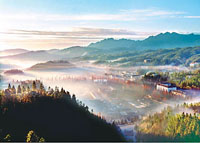
Jinggangshan, an old revolutionary base in east China's Jiangxi Province, is starting to explore overseas tourism markets.
The Hong Kong and Macao special administrative regions will be the first two target markets, said Peng Jianxian, deputy director of the Jinggangshan Tourism Bureau.
As the base for the Red Army in 1928, Jinggangshan has been widely recognized as the "Cradle of the Revolution," a place for students and other young people to be educated about the Chinese Communist Party's history.
Promoting itself to overseas tourists has not been easy. "But with transportation conditions improved, we have taken the first step," said Peng.
Thanks to the opening of the Ganyue Highway linking Jiangxi and Guangdong provinces, a bus tour route between Hong Kong and the mountainous Jinggangshan area, via Guangdong Province, has become possible.
"More than 1,000 tourists from Hong Kong visited Jinggangshan in just one week during the Spring Festival holiday last year," said Peng.
He said tourism products would be promoted in Hong Kong this month or next.
In July the city's tourism association also reached an agreement with its counterpart in Macao on tourism development cooperation.
"Macao will be a platform where tourists from Portuguese-speaking countries can come to find about Jinggangshan," said Peng.
According to the agreement, tourists from Macao can get on buses in the city of Zhuhai in Guangdong Province and travel for 10 hours to get to Jinggangshan.
The tour route will be further discussed, with more tourism spots added along the way so tourists will not get too tired or bored on the trip, he said.
In order to protect the environment, the local government has even moved 25 kilometers away, involving 12,000 public servants and their families.
Currently, there are less than 10,000 people living in the town of Ciping at the centre of Jinggangshan.
"We will map out some more favorable policies to encourage more residents to move out of the mountains, leaving only a tourist centre there to serve visitors in the future," said Zeng Binglong, vice-mayor of Jinggangshan.
(China Daily August 21, 2006)
|

